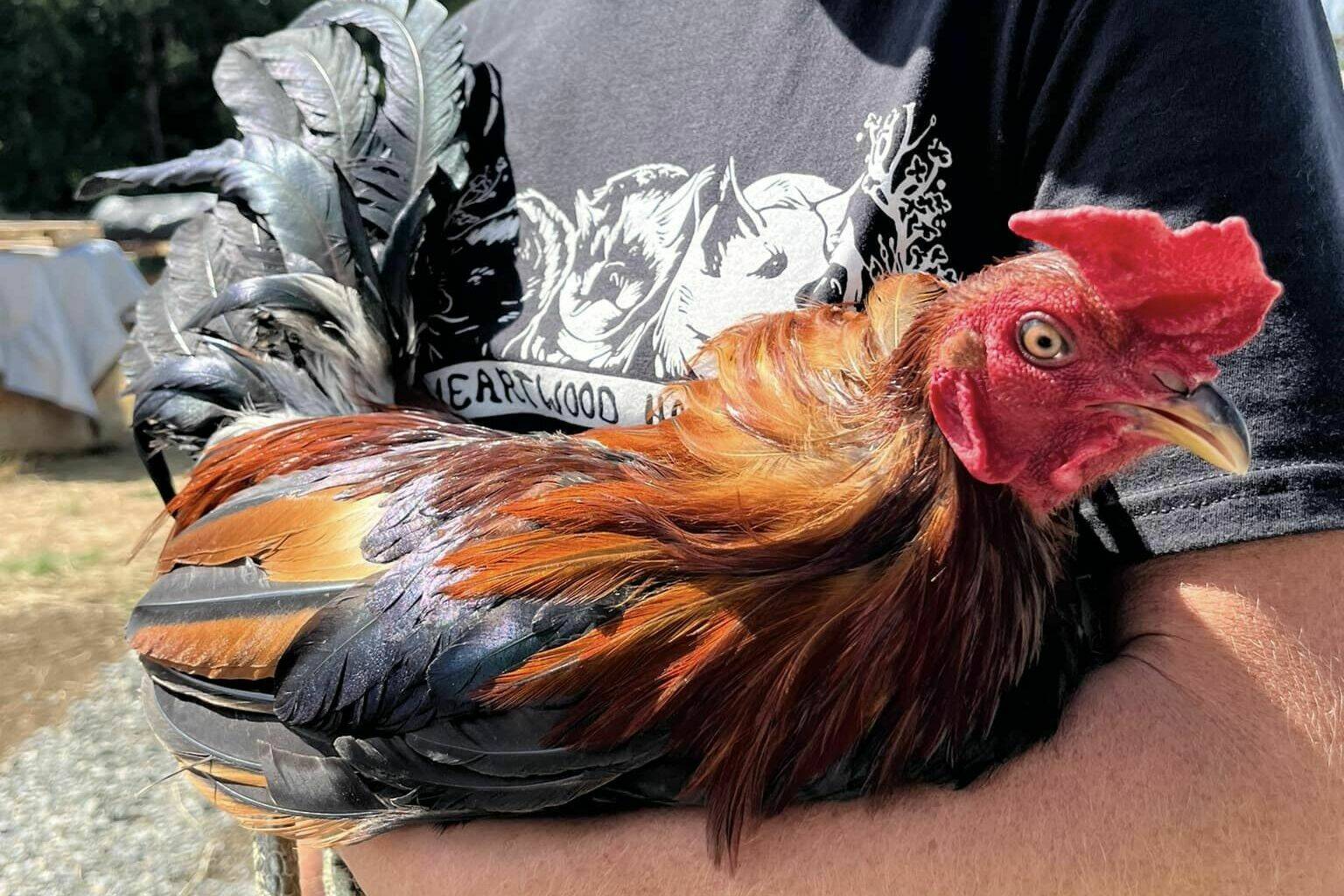When the Pierce County Sheriff’s Department and Animal Control recovered more than 230 birds from a suspected cockfighting training facility in Buckley on Aug. 1, they didn’t mince words about the risks of rescued roosters and the surprise outcome of the bust.
”Usually in a cockfighting ring, the birds are too dangerous to be around people or other birds because of their potential to fight and be aggressive,” said PCSD Sergeant Darren Moss in a Facebook video on the department’s page. “But in this instance, Animal Control was able to find shelters that said they’ll try to place all these birds in homes. That way, we don’t have to destroy them.”
But Roy, Washington-based Heartwood Haven Executive Director Kate Tsyrklevich said this couldn’t be further from the truth – not just the fact that the vast majority of rescued roosters are not violent around other birds or people, but that law enforcement chooses to euthanize these birds rather than spend time to find rescues like hers to take them in.
“The reality of the situation is the Pierce County Sheriff’s [Department] has never saved a single rooster from cockfighting before and I’m not sure what is their qualifications for making any kind of assessment on an animal,” said Tsyrklevich, whose nonprofit has taken in hundreds of roosters from cockfighting busts from around the country for the last seven years and have only had to deem a small fraction as “human aggressive”; the rest went on to homes and successfully integrated with hens and young kids.
“These roosters are not aggressive; even the cockfighters themselves who are training them will tell you the same thing,” she said.
Jewl Johnson, the founder and executive director of Denver, Colorado’s Rooster Sanctuary, prefers to use the word “conditioning” – not “training” – but otherwise completely agreed with her Washingtonian peer.
Johnson said that breeders will cull roosters based on various traits until they have birds more suited for fighting – one of those conditions is if they’re unable to work with their handlers.
“Roosters that turn on humans, they show too much aggression to work with, that’s considered a defect, and they’re culled,” she continued. “Typically, the roosters that are… removed from game farm situations, cockfighting situations, they’re going to be a lot more handleable.”
But at the same time, Johnson said these roosters are highly empathetic and can react negatively to a human’s fear and anxiety – which can include possible emotions of an animal control worker attempting to remove these birds from a familiar, if traumatic, environment, which could help perpetuate the idea that these roosters are dangerous.
Joshnson added that that law enforcement is “dishonest” when it comes to describing the actual nature of rescue roosters; Tsyrklevich was less kind.
“Pierce County, and every single past bust, has euthanized the birds. It’s not because they’re aggressive,” she said. “… They don’t want to do the work themselves to save the birds. It’s easier for everyone to just euthanize the birds and not bother with it.”
Tsyrklevich added that she believes the only reason the PCSD reached out to her rescue is because they did not want a repeat of a May incident where 64 birds in Yakima that were supposed to be taken in by Heartwood Haven were instead shot and killed “one by one” by law enforcement, according to King 5.
That news made waves in Washington, Tsyrklevich said, so the PCSD is “trying to save their own asses” by getting these birds into a rescue home in order to avoid another Yakima incident.
But it’s not just the fault of law enforcement and animal control, Tsyrklevich continued – it’s the fact that counties have not allocated resources to their own shelters to be able to take in rescue birds for adoption like cats and dogs.
“What should be happening is that the animal control jurisdictions should be housing these birds in county shelters that get paid for by our tax dollars, and our counties should be doing the PR and the media and the adoptions for them, and not just relying on one single rescue in Washington to handle all these cases,” she said. “There are homes out there. It is possible to rehome them. And most other county shelters have way more resources than we do.”
PIERCE COUNTY RESPONSE
The Sheriff’s Department POI Courteney Bealko said that potential violence is only one of the considerations police consider when it comes to cockfighting birds.
Another, as Tsyrklevich said, is funding.
“Multiple factors, such as the potential for an animal to display aggression once trained to do so, the paucity of financial resources dedicated to animal care in any given agency, and the lack of appropriate long-term housing a bird needs to demonstrate it is safe to rehome has, in the past, lead to the euthanasia of roosters in many jurisdictions,” Bealko said in an email interview.
She also said the “unfortunate outcome” of the Yakima birds was what led the PCSD to Heartwood Haven.
Bealko said she does not recall when the department raided a cockfighting ring in the last five years, but in the future, they “would encourage Heartwood Haven to reach out to us directly if they are concerned with the comments and give us a chance to have a discussion before choosing media to show their displeasure and the more we all work together, the more animals we can all save.”
ADOPTION
Heartwood Haven took in 110 roosters (in a previous Courier-Herald article, it was reported that 232 roosters were rescued, but that was the total number of roosters, hens, and chicks) from the Aug. 1 bust, with every expectation to find them a home they will thrive in.
The vast majority have been rehomed or are schedule to be, but there are still a few that can be adopted.


